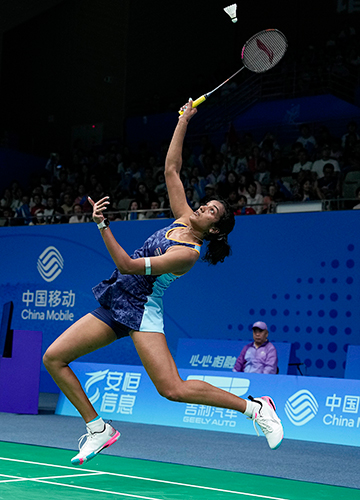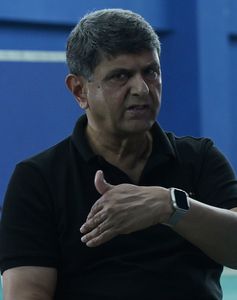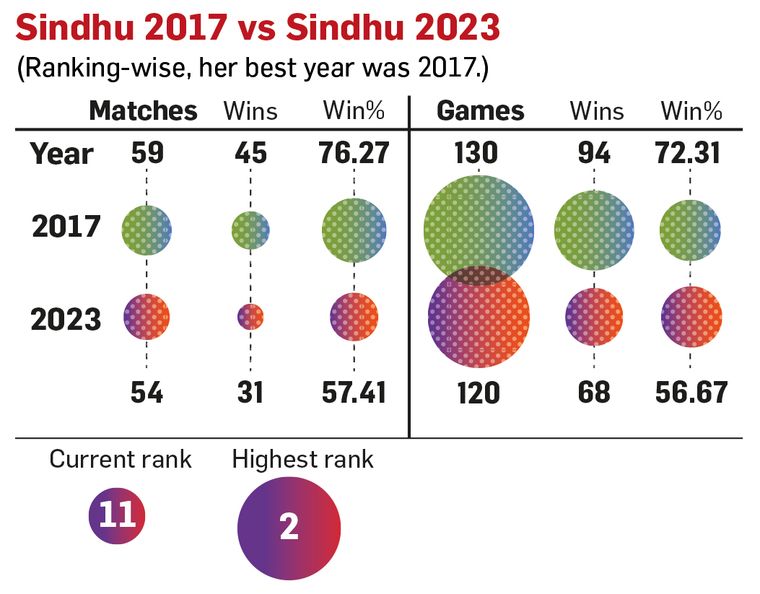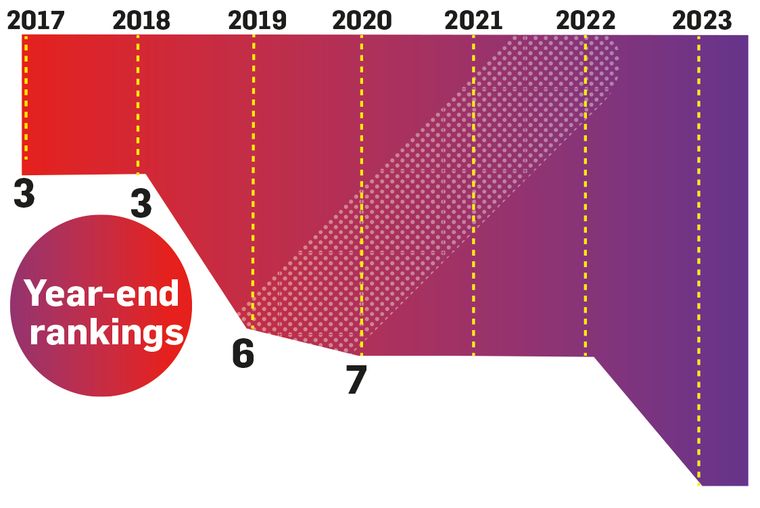Exclusive Interview/ P.V. Sindhu & Prakash Padukone
It was an exhilarating and sapping finals. The ladies on either side of the net refused to give up. Eventually one had to. On August 19, 2016, P.V. Sindhu ended up with the silver medal while friend-cum-foe Carolina Marin became Olympic champion after a three-set duel. Sindhu has been there and seen that. The gold is what she wants, as athletes across the world prepare for the Paris Games. The bitter taste of ending on the losing side has stayed with her all these years, and it has made her hungry for gold.
Sindhu is the most followed Indian badminton star with 3.1 million followers on X, the same number on Facebook and by close to 100 million Indians on television. The ace does not mention anywhere in her bio that she has won two Olympic medals―the silver at Rio 2016 and a bronze at Tokyo 2020. Winning even one Olympic medal would make many athletes mention it in ALL CAPS, but not Sindhu. Because her quest for the elusive Olympic gold is still on. As if it is now or never for the 28-year-old, though badminton has had older champions.
Sindhu was 20 when she won her silver in 2016; she has five World Championship medals, including a gold. Yet, the Olympic gold is the biggest miss in her trophy cabinet.
Of course, becoming a champion and staying at the top is not easy. Sindhu suffered a stress fracture on her left ankle which kept her out of the year-ending BWF finals in 2023. She was injured during the Commonwealth Games in August even though she persevered to win the title. “Her doctor advised her to take some more time, so that she recovers completely ahead of the new season,” said her father, P.V. Ramanna.
During the break, she moved base from Hyderabad to Bengaluru to the Padukone-Dravid Centre for Sports Excellence, where she had all facilities―from training to exercise and physio―under one roof. The results have not been immediate, but the Sindhu Express is well on its way to Paris.
Prakash Padukone, former badminton world number one who is now her mentor, has definite ideas on coaching. “She is a terrific ward,” he says, in this first joint interaction after taking charge.
“There will be pressure, but I am taking it one day at a time,” said Sindhu. She knows that it is not just her game, but also the mental cobwebs that need clearing up. In this interview, the duo talk about the expectations, the focus over the next month or two, and their common goal now.
Excerpts:
Prakash, how has the experience of coaching an Olympic medallist been so far?
Prakash: Since September, Sindhu has been here. She was playing a few tournaments in between and got injured. Then she had to do her rehab, for which she had to be in Hyderabad. Actually, we got probably a month in Bengaluru 10 days before Asiad. Of course, she will keep going and coming back. She will be here in Bengaluru till the middle of February. It has been very nice working with her―an absolute pleasure. She is a good student, very disciplined and dedicated, willing to listen, despite five world championships and two Olympic medals. She still feels she is a first-timer. She is willing to listen to not just me but anybody. That is a hallmark of champions. She is very open to ideas not just on court, but also in the gym.
Basically, what we are trying to do is put a professional team together. I am mentoring her more in strategy than practice. We have an Indonesian coach Agus Dwi Santoso from January 1. My job is to coordinate.
When you say your job is to strategise, how different is this role from previous ones?
Prakash: Five to 10 years ago, I had to be on court to actually make players [practise]. That, the Indonesian coaches do now.
Sindhu (laughs): No, sir also spends time to see [our progress].
Prakash: My way of teaching is that the player is the ultimate authority; the coach is there to guide the player. The player has to be convinced, have a game plan, analyse, be convinced why we are playing the stroke. These were the things very prominent in the 1980s when we were young. Emphasis was not so much on the physical.
What I am trying to do is combine the advantages of both [the times]. Try to take strengths of that time, and take those of the present generation, and create a style of your own―create something different from what everybody else is doing. Use of deception, wrists, good footwork…. We are good at this as Indians.
Is convincing players easy or difficult?
Prakash: Player intelligence is always there. Otherwise she would not have won so many tournaments.
Sindhu, how desperate are you for a medal at the Olympics?
Sindhu: Of course, I am desperate. I am sure everybody is desperate to get that gold, but I think to get there, we have to do what we have to do. It is important we get everything right. Not just me, the whole team has to be on same page. Even from my side, I need to push myself and implement what they say.
Is the change playing on Sindhu’s mind?
Prakash: No, I think she is coming out of injury. Maybe she rushed herself a little bit; maybe, one or two months earlier, she was not fully fit. We have done some tests, used a lot of science. Maybe that is the difference in what we were doing earlier and now.
Earlier, without doing anything, she was winning titles. The problem started when she was not doing as well as she had been, and did not know where to start.
We started asking: are you doing this or that―using a mental trainer, doing regular video analysis. She was doing it, but not on a regular basis. Now, she has a very structured and strong team which is monitoring her on a daily basis―her weight, diet, sleep, recovery…. We are trying to do our best. My advice to Sindhu would be to not think of gold. It is important, but focus more on the process, do your preparation well and treat it like any other tournament. If you keep thinking ‘I have to win’, that puts you under pressure.
What kind of a ward is she?
Prakash: Very disciplined, and receptive to new ideas. Not often do you get a student like this who has already achieved so much! So when I tell her something, she is able to execute it the next day.
How difficult was it to shift base?
Sindhu: Not difficult, I would say, when it happened. I was worried. Nothing was going right. You are playing, but still nothing right was happening.
Were you prepared for all the difficulties that came your way with the change?
I would not say difficulties, but I thought there would be a change. There should be a change, everything cannot be the same.
Mentally, you are in a good space?
Sindhu: Yes.
Prakash: If you are physically and mentally fit, your game would automatically fall into place. I think earlier she was in a confused state of mind. It was just a question of having clarity of thought.
Slipping from number 2 to number 11―does that bother you?
Sindhu: It does not bother me, because if you do everything right, I am 100 per cent sure that the ranking will improve automatically. You go with a mindset―yes, I am mentally and physically fit―and the ranking will take care of itself.
What do you expect of Sindhu, now that she is under your guidance and tutelage?
Prakash: Her brief is very clear. Any tournament you play, whether in the district level or the Olympics, you have to play to win. If you are not fit enough, don’t play for the sake of participating.
Ranking, according to me, is misguiding. [It is possible to] get into the top 10 without beating any of the top players. More important for me will be to win the important tournaments. The colour of the medal is not important. Any tournament you play, you play to win―that is the brief.
This is an Olympic year.
Prakash: Take a break, and do analyses properly―that is what we did. We think we are on the right track.
Things are very different from the days you played.
Prakash: It is entirely different (laughs). In my days, there was no such big [support] team. It is a big change, but you have to adapt to change. Ten years ago, most players had one coach who doubled as trainer. Nowadays you might be an All England champion or world no 1, but if you say, ‘I alone will help this player’, it would not happen.
It is important to know a lot more things today. The science of sport has come a long way. Sindhu is definitely a contender for an Olympic medal, but you never know. We are trying to make use of the best info and science.
What made you agree to take her on board?
Prakash: She was doing well. My style of coaching is old-fashioned. I thought if I ask her, she would say, ‘What will you teach now?’
Sindhu: No, I think it is a ‘once in a lifetime’ opportunity. Who would say no?
Prakash: She was going through a very bad patch…. I read her interviews and thought: this is the time I should at least ask and [offer help]. Otherwise I will regret it for a lifetime. She said, ‘Of course, I would like to.’
I did not even approach her directly. I thought she would feel odd to say yes or no. So I asked Viren [Rasquinha] of OGQ (the non-profit Olympic Gold Quest] to ask and she said yes.
Are you satisfied with the way badminton is going up in the country?
Prakash: Yes, it is going up, but a lot more can be done. There needs to be a little more professional approach from the federation though they are already doing a lot…. PBL (Premier Badminton League) can add to the popularity; more kids will be playing.
Do you go home with a smile on your face?
Prakash: Yes
Sindhu: It is just one day at a time for me. There will be pressure, but I won’t think much about that. If things work out, they work out.






